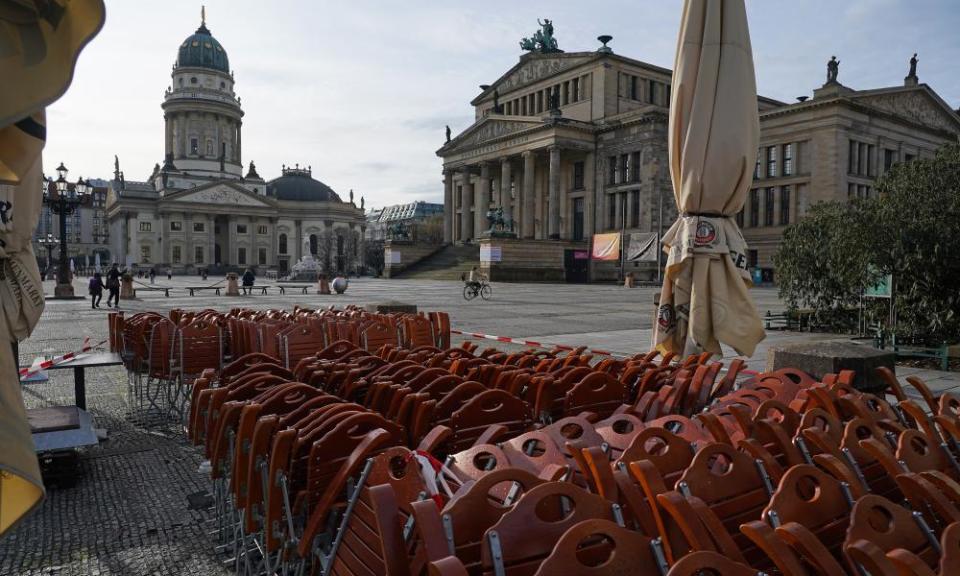Global report: Germany's Covid death toll exceeds 50,000

Germany has passed 50,000 Covid deaths, France was told it may soon need a third national lockdown and Belgium and Ireland warned that it was too early to think about easing restrictions as the pandemic continues to hold Europe in its grip.
The German health minister, Jens Spahn, said on Friday that, despite a slowdown in infections, an extension and intensification of lockdown until late February or early March was essential to prevent a “considerable worsening” of the situation.
The death toll in Germany, which handled the first wave of the pandemic better than most in Europe, has been increasing at an average of 1,000 deaths a day, and on Friday hit 50,642, but, although cases are now falling, Spahn said caution was crucial.
“The numbers of the last few days are encouraging,” he said. “They are going in the right direction. We are seeing the first easing on intensive care wards. But the numbers are still too high, and what we need is to collectively … suppress them.”
Angela Merkel and Germany’s 16 state leaders agreed on Tuesday to keep schools, restaurants and all non-essential businesses shut until at least 14 February. A survey for the broadcaster ARD found almost half of Germans felt the measures were a burden.
Spahn said he understood people’s ambivalence to the decision, but added that ICU wards were still dangerously full and the new, more contagious variants first identified in the UK, South Africa and Brazil were a serious threat. “We don’t want to be accused of relaxing too soon,” he said.
France, meanwhile, will have to resort to a third strict lockdown if it fails to rein in the more contagious variants, Arnaud Fontanet, a member of the scientific council that advises the government on Covid-19 policy, said on Friday, adding that the country was in a “very tense situation, with exhausted hospital staff”.
Portugal, which has this week been breaking daily death toll records and on Wednesday hit a record 14,647 new cases in one day, mainly as a result of the UK strain, ordered all schools to close for 15 days from Friday.
“Lots of people are cracking, lots of people are burning out and it gets harder and harder,” one intensive care doctor, Gustavo Carona, said. “Everyone is very tired.”
Belgium’s health ministry said that, despite stabilising infection numbers and falling daily deaths, the numbers of people being admitted to hospital had recently started rising again and it was too early to ease measures yet.
“For the moment, the virus still has its hand in the game, but we still have our two best players: vaccination and spring,” spokesman Yves Van Laethem said. “The situation remains fragile, on a plateau too high for health systems.”
Authorities in Ireland are considering leaving the country in lockdown for a further six weeks amid the spread of a new UK variant, according to reports in local media. The country’s death rate is at its highest since the start of the pandemic, with an average of 44 deaths a day in the past week, but the infection rate has nearly halved since earlier in January.
Greece, however, in lockdown since 7 November, could soon reopen junior and high schools as the country’s case load continues to drop. Local media reported that scientists advising the government said schools could reopen on 1 February.
The move would follow the reopening of shops for the first first time in more than two months on Monday, albeit under strict coronavirus restrictions limiting entry to stores to one person per 25 square metres.
Gkikas Magiorkinis, who is among the scientists on the advisory committee, said authorities would be “very cautious about lifting measures. We don’t want people to gather indoors. If restaurants open it will be strictly with tables outdoors.”
As vaccination programmes roll out slowly across the continent, the European commission said it would seek clarification from Pfizer over whether there would be fresh delays in delivering Covid vaccines to member states next week.
Government officials from a number of EU states have said the US-based drug maker had halved the volume of Covid vaccines it was delivering this week, with Romania and Poland getting only about 50% of their planned volumes and the Czech Republic reporting a 15% fall.
Hungary, meanwhile, has signed a deal to buy 2m doses of Russia’s Sputnik V vaccine, the foreign minister, Péter Szijjártó, said, becoming the first EU member to break ranks and unilaterally approve the shot as frustrations build over the delays.
The European Medicines Agency (EMA) has so far authorised only the Pfizer/BioNTech and Moderna vaccines but is expected to decide on the Oxford/AstraZeneca jab on 29 January. Russia filed for registration of the Sputnik vaccine in the EU on Wednesday, before an EMA review next month.

 Yahoo Finance
Yahoo Finance 